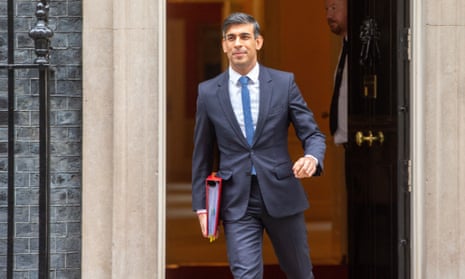
Rishi Sunak has successfully navigated a contentious dispute over his Rwanda deportation bill, as a Conservative rebellion dwindled, and right-wing MPs hesitated to further challenge the prime minister's authority.
Following a crucial meeting involving over 45 Tory rebels, leaders of the group feared that aligning with Labour to defeat the bill during an election year could jeopardize the stability of the government. Ultimately, only 11 Conservative hardliners, including former Home Secretary Suella Braverman and ex-Immigration Minister Robert Jenrick, voted against the legislation. The bill passed with 320 votes to 276, securing a majority of 44.
Despite days of chaos and internal discord at Westminster, where numerous Tories rebelled in support of amendments to strengthen the legislation, the bill successfully cleared its final hurdle in the Commons. However, Sunak now faces potential challenges in the House of Lords, where peers are threatening amendments to ensure compliance with international law.
Legal challenges are expected from individuals facing deportation to Rwanda, with government lawyers acknowledging a "50/50" chance of the first flight taking off before a possible autumn general election. The Home Office has reportedly selected the initial 100 people for deportation, citing no apparent grounds for appeal in these cases.
Sunak's victory in the Commons comes at the cost of resignations, including two Conservative party deputy chairs, Lee Anderson and Brendan Clarke-Smith. Moreover, scores of MPs within his party argue that the deportation policy is flawed.
Despite Sunak's success in quelling the rebellion, 61 Tory MPs rebelled on a separate amendment designed to block last-minute injunctions from European judges, highlighting continued dissent within the party. The shadow home secretary, Yvette Cooper, criticized the chaos, stating that the prime minister's authority is now in tatters.
While Sunak pledged to "get a grip" on the small boats crisis during Prime Minister's Questions, reports suggest the Home Office has lost contact with over 4,000 people earmarked for removal to Rwanda.
The government attempted to make the bill more acceptable to Tory MPs by offering concessions, including changes to Whitehall rules directing civil servants to ignore Strasbourg judgments. However, unions condemned these plans, raising concerns about potential violations of international law.
As the bill advances to the House of Lords, Sunak, despite surviving this internal challenge, faces a precarious path with potential legal hurdles and ongoing opposition from within his party.
